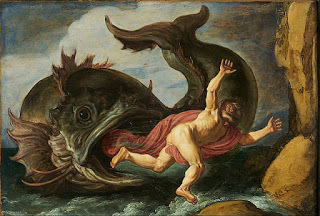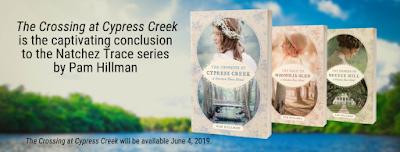Where's a Whale When You Need One?

by Pam Hillman
We’ve all read the story of Jonah, right? God wanted Jonah to go to Nineveh and preach to the Ninevites. Jonah refused to go and boarded a boat with the intention of getting as far away as he could.
Well, that didn’t work out so well when God caused a great storm and the sailors on the boat cast lots and the lot fell on Jonah. Knowing he was caught, Jonah told them to throw him overboard, and you know the rest.
God had prepared a great fish to swallow up Jonah and spit him out on land close to… you guessed it, Nineveh.
So, how does this relate to writing?
I’m not sure about the rest of you, but many of my characters and even portions of my plots run parallel to some Biblical story. I don’t start out to write mirror images of Biblical characters, and I don’t plot from that perspective, but eventually, when all the wrinkles are ironed out, I tend to have a lot of parallels. Some are more obvious than others.
When I first started working on my Natchez Trace Novel series, I had no clue that the three brothers would end up symbolizing the three men in The Prodigal Son. When my editor needed to know the spiritual thread that connected the series, I started lookin at my notes and discovered this aspect staring me in the face. It was there all the time… I just hadn’t seen it.
In The Road to Magnolia Glen, Quinn sacrifices his own desires for freedom from familial responsibility when he takes on the responsibility of three additional people. This type sacrifice is rampant in fiction and readers are drawn to characters who sacrifice their own goals for others, especially when the hero sacrifices his own goals for the heroine.
The examples above relate to characters, but there’s also a parallel to my actual plots in many cases. Once I realized that Connor, Quinn, and Caleb symbolized the father, the elder brother, and the prodigal son, I was able to dig deeper into how each would act and react to situations regarding each other. I wouldn’t say that this aspect of the stories bled over into the romances or even the current situation each man found himself in, but they brought their past with them, and knowing the family dynamics helped me flesh them out and stay in character.
The hardest character for me to nail down in The Crossing at Cypress Creek was Alanah’s uncle. I was well into the first draft before I figured out what kind of man Uncle Jude was. And when I did, he ended up mirroring a Biblical character. Some readers have picked up on Jude’s alter-ego, while others haven’t. So, I guess it was a little more subtle than I thought. But knowing who he was based on made writing him much easier, but in some ways, much harder. Because the Biblical Jonah has always been a conundrum to me. I never could understand why he did what he did. Maybe I still don’t really understand, but fleshing out Uncle Jude in my own way in the 18th century gave me a bit more insight into the Biblical Jonah.
 By Pieter Lastman - IAFT8IfCTfplRQ at Google Cultural Institute maximum zoom level, Public Domain
By Pieter Lastman - IAFT8IfCTfplRQ at Google Cultural Institute maximum zoom level, Public Domainhttps://commons.wikimedia.org/w/index... then there’s the external plot points that need to be implemented when trying to “rewrite” something from the Biblical stories.
In Stealing Jake, Jake has to face his greatest fear when he’s trapped in a mine after an explosion…for the second time in his life. He rises to the occasion and turns into the darkness of the mine to rescue others. The phrase “for such a time as this” rings over and over in his head. I don’t rehash the story of Esther, or even mention her name, but just using the phrase clued many readers in to the similarities of the situation.
And then there was my latest conundrum. What do you do when you need a whale, but your story is landlocked? I struggled with this aspect of The Crossing at Cypress Creek for weeks. Once I knew who Uncle Jude was modeled after, I really, really wanted him to have a “whale” moment. But the how kept eluding me. I brainstormed with writer friends, landing on one idea after another before discarding them all as not feasible. Then, I finally found a solution that worked. It wasn’t a whale, but close enough. I put Uncle Jude in a dark, dank root cellar. Injured, trapped, and going in and out of consciousness, I had him in his “whale” and he came to an understanding with God.
Sometimes the whale eludes us until right at the time we need it most. But if we keep searching, keep writing, and keep plotting, we’ll finally find that whale.
As a writer, where’s your whale? What parallels can you think of in your characters or plots with Biblical stories? As a reader, have you read books where characters or plots made you think of a story from the Bible or even Greek mythology?
 www.pamhillman.com
www.pamhillman.com
Published on July 25, 2019 21:00
No comments have been added yet.



